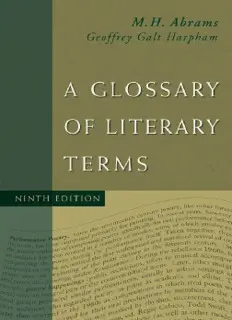
A Glossary of Literary Terms PDF
Preview A Glossary of Literary Terms
✵ A Glossary of Literary Terms NINTH EDITION M. H. ABRAMS CornellUniversity GeoffreyGalt Harpham NationalHumanitiesCenter Australia•Brazil•Japan•Korea•Mexico•Singapore•Spain UnitedKingdom•UnitedStates AGlossaryofLiteraryTerms, ©2009,2005 WadsworthCengageLearning NinthEdition ALLRIGHTSRESERVED.Nopartofthisworkcoveredby M.H.Abrams,Geoffrey thecopyrighthereinmaybereproduced,transmitted, GaltHarpham stored,orusedinanyformorbyanymeansgraphic, electronic,ormechanical,includingbutnotlimitedto photocopying,recording,scanning,digitizing,taping, Publisher:MichaelRosenberg Webdistribution,informationnetworks,orinformation ManagingDevelopmentEditor: storageandretrievalsystems,exceptaspermittedun- derSection107or108ofthe1976UnitedStates KarenJudd CopyrightAct,withoutthepriorwrittenpermissionof SeniorEditorialAssistant: thepublisher. MeganGarvey ContentProjectManager: Forproductinformationandtechnology JessicaRasile assistance,contactusat CengageLearningAcademicResourceCenter, ProductionTechnologyAnalyst: 1-800-423-0563 JamisonMacLachlan Forpermissiontousematerialfromthistextor SeniorArtDirector: product,submitallrequestsonlineat CateRickardBarr www.cengage.com/permissions. Furtherpermissionsquestionscanbe SeniorPrintBuyer:BetsyDonaghey e-mailedto TextPermissionsEditor:Margaret [email protected]. Chamberlain-Gaston ProductionService/Compositor: LibraryofCongressControlNumber:2008924505 Newgen ISBN-13:978-1-4130-3390-8 CoverDesign:RossCarronDesign ISBN-10:1-4130-3390-3 WadsworthCengageLearning 25ThomsonPlace Boston,MA02210 USA CengageLearningproductsarerepresentedin CanadabyNelsonEducation,Ltd. Foryourcourseandlearningsolutions,visit academic.cengage.com. Purchaseanyofourproductsatyourlocalcollege storeoratourpreferredonlinestore www.ichapters.com. PrintedintheUnitedStatesofAmerica 1 2 3 4 5 6 7 12 11 10 09 08 ✵ To Ruth This page intentionally left blank ✵ About the Authors M. H. Abrams, Class of 1916 Professor of English at Cornell University, Emeritus, is a distinguished scholar who has written prize-winning books on eighteenth- and nineteenth-century literature, literary theory and criticism, European Romanticism, and Western intellectual history. His A Glossary of Literary Terms is a series of succinct essays on the chief terms and concepts used in discussing literature, literary history and movements, and literary criticism. Since first published in 1957, the Glossary has become an indispensable handbook for all students of English and other literatures. Geoffrey Galt Harpham is president and director of the National Humanities Center in North Carolina. He has written extensively in the fields of intellectual his- tory and critical theory, and on the work of Joseph Conrad. Among his books are The Character of Criticism, Shadows of Ethics: Criticism and the Just Society, and Language Alone: The Critical Fetish of Modernity. v This page intentionally left blank ✵ Contents PREFACE ix ACKNOWLEDGMENTS xi HOW TO USE THIS GLOSSARY xii LITERARY TERMS 1 INDEX OF AUTHORS 383 vii This page intentionally left blank ✵ Preface This book defines and discusses terms, critical theories, and points of view that are commonly applied in classifying, analyzing, interpreting, and writing the history of works of literature. The component entries, together with the guides to further read- ing included in most of them, are oriented especially toward undergraduate students ofEnglish, American, and other literatures. Over the decades, however, the book has proved to be a useful and popular work of reference for advanced students, as well as for the general reader with literary interests. A Glossary of Literary Terms consists of succinct essays in the alphabetic order of the title word or phrase. Terms that are related but subsidiary, or that designate sub- classes, are discussed under the title heading of the primary or generic term; in addi- tion, words that are often used in conjunction, or as mutually defining contraries, are discussed in the same essay. The alternative organization of a literary handbook as a dictionary of terms, defined singly, makes dull reading and requires excessive repeti- tion and cross-indexing. It may also be misleading, because the application of many terms becomes clear only in the context of other terms and concepts to which they are related, subordinated, or opposed. The essay form also makes it feasible to sup- plement the definition of a literary term with indications of its changes in meaning over time, and of its diversity of meanings in current usage, in order to help readers steer their way through the shifting references and submerged ambiguities of its var- ied applications. In addition, the discursive treatment of literary terms provides an opportunity to write entries that are not only informative, but pleasurable to read. In each entry, boldface identifies terms for which the entry provides the principal discussion, and italics indicate terms that are discussed more fully elsewhere in the Glossary. The purpose of this new edition is to keep the entries current with innovations in critical views and methods, to take into account important new publications in literature, criticism, and scholarship, and also to take advantage of suggestions for im- provements and additions, some solicited by the publisher and others volunteered by users of the Glossary. All the entries have been reviewed, and most of them have ix
